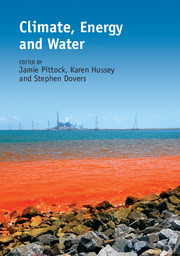Book contents
- Frontmatter
- Contents
- List of contributors
- Acknowledgements
- 1 Justifying, extending and applying “nexus” thinking in the quest for sustainable development
- 2 Water resources, climate change and energy
- 3 Implications of climate change for energy systems in a multisectoral context
- 4 Fossil fuels and water: A complex and evolving relationship
- 5 Renewable energy and water
- 6 Hydropower within the climate, energy and water nexus
- 7 Water and biofuels
- 8 Trade-offs and synergies between water and energy use in rural Australia
- 9 Management of the urban energy-water nexus
- 10 Managing the electricity-water nexus in China, France, India and the United States
- 11 Cross-sectoral governance of the climate, energy and water sectors: A ‘Rubik's cube’ analysis of cross-sectoral co-ordination
- 12 Regulation of the nexus
- 13 Climate, energy and water: the potential roles and limitations of markets
- 14 Strategies to mainstream climate change, energy, water and food security nexus knowledge and skills
- 15 A nexus of nexuses: systemic governance for climate response
- 16 Integrated modelling of the energy-water nexus in the American West
- 17 Biodiversity and the climate, energy and water nexus
- 18 Consumers, food supply chain and the nexus
- 19 Future prospects in climate, energy and water research and policy
- Index
9 - Management of the urban energy-water nexus
Published online by Cambridge University Press: 05 April 2015
- Frontmatter
- Contents
- List of contributors
- Acknowledgements
- 1 Justifying, extending and applying “nexus” thinking in the quest for sustainable development
- 2 Water resources, climate change and energy
- 3 Implications of climate change for energy systems in a multisectoral context
- 4 Fossil fuels and water: A complex and evolving relationship
- 5 Renewable energy and water
- 6 Hydropower within the climate, energy and water nexus
- 7 Water and biofuels
- 8 Trade-offs and synergies between water and energy use in rural Australia
- 9 Management of the urban energy-water nexus
- 10 Managing the electricity-water nexus in China, France, India and the United States
- 11 Cross-sectoral governance of the climate, energy and water sectors: A ‘Rubik's cube’ analysis of cross-sectoral co-ordination
- 12 Regulation of the nexus
- 13 Climate, energy and water: the potential roles and limitations of markets
- 14 Strategies to mainstream climate change, energy, water and food security nexus knowledge and skills
- 15 A nexus of nexuses: systemic governance for climate response
- 16 Integrated modelling of the energy-water nexus in the American West
- 17 Biodiversity and the climate, energy and water nexus
- 18 Consumers, food supply chain and the nexus
- 19 Future prospects in climate, energy and water research and policy
- Index
Summary
Introduction
The influence of urban water management on energy use is substantial. Approximately 8 per cent of Australia's 2009 greenhouse gas emissions (24 t CO2-e/person) are influenced by water policy in cities. Much of the influence is associated with the use of water, in homes and industry. This is, consequently, ‘hidden’ from the much smaller (although still large) energy balances assessed and managed by water utilities. Understanding and managing this wider pool of energy is vital in order to avoid perverse impacts such as increasing greenhouse gas (GHG) emissions during water conservation efforts.
The energy consumption of urban water in Australia is anticipated to grow 200 to 250 per cent by 2030, from 2007 levels, largely as a result of ‘climate resilient’ desalination and water reuse systems. This chapter argues that co-ordinated management of water and energy in cities is both a need and an opportunity to find efficient and low-cost solutions to water shortages and emissions targets. Such solutions will require integrated water and energy research, planning, funding, regulation, standards, data, targets and reporting. Collaboration across the industry sectors and government will be necessary to generate knowledge and policy in major gaps, including (a) quantification of links between water and energy in the industrial and commercial sectors, (b) understanding of the strong economic, social and institutional factors of relevance and (c) generate real understanding of the variability in the systems as opposed to the current over-reliance on ‘averages’.
The significance of water-related energy in cities
The energy associated with urban water provision in Australia in 2006–07 accounted for 13 per cent of national electricity use, plus 18 per cent of natural gas consumption. It totalled some 6,800 gigawatt-hours of primary energy use per 1 million people (Table 9.1; Kenway et al. 2011a), representing 9 per cent of Australian primary energy use.
- Type
- Chapter
- Information
- Climate, Energy and Water , pp. 141 - 154Publisher: Cambridge University PressPrint publication year: 2015



